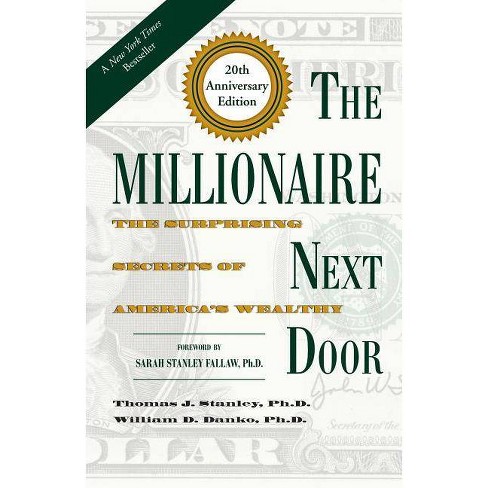
8 Money Habits of the Successfully Rich “Millionaire Next Door”
I have always been curious about the money habits of successfully wealthy individuals. Often, these habits were the catalyst that made them extremely rich. When we plan to achieve our goals, we require specific habits that will enable us to attain success and amass wealth. We can model these habits from others who are already successful.

I have been a fan of the book by Dr. Thomas J. Stanley and Dr. William D. Danko called “The Millionaire Next Door.” The book is extensive research done by the authors on millionaires across decades of study. The research process included meeting over 500 millionaires in face-to-face meetings, and we learned many eye-opening habits in these interactions.
Most of us may view someone as rich based on the car they drive or the house they live in, but the book helped me, and many reframe what it means. Many of us have no clue what the “real” affluent households are and their inner workings. We think hyperconsumerism means rich. We often see wealth on television and in movies depicted in this way. The extensive research in this book and the lessons we can learn from it are invaluable. I present the 8 lessons I have learned while reading the book.
1. Live Below Your Means
We often see the rich living the Hollywood life showing their wealth on social media, on television, and in movies living a life of luxury, showing their designer bags, and expensive mansions with garages filled with the fanciest cars.
In contrast, the book “The Millionaire Next Door” shows that the typical American millionaire does not live this way. On the contrary, the millionaire next door often practices the “Art of Stealth Wealth,” which I wrote about before. They live a modest lifestyle and often live in neighborhoods among the middle class. They live among us without us knowing it at all.
Dr. Stanley and Dr. Danko wrote the book to overturn the myths propagated by the mass media that millionaires live ostentatiously the way we see them in reality television or social media.
To reach financial freedom, the critical habit is to live below our means. The book’s research showed that millionaires live incredibly frugally. This habit resulted in many millionaires becoming rich. One example in the book is a husband and wife who are both engineers. They both have great jobs, but they decided to only live on one income and save the entirety of the other income. This included every raise they received going towards their savings and investments.
The habits of millionaires are often similar to how the FIRE movement worked. They value financial freedom and independence instead of showing their wealth, buying ostentatious luxury items, or showing the world their wealth. They let their bank accounts and assets speak for themselves.
2. Save and Avoid Debt
In the book, Dr. Stanley and Dr. Danko defined two types of people: the UAWs, or “Under Accumulators of Wealth,” and the PAWs, or the “Prodigious Accumulator of Wealth. The Under Accumulator of Wealth (UAW) defines individuals with low net worth compared to their income. One example is a 45-year-old doctor earning a high income, like $250,000 per year, but their net worth is far less than they should have saved. Therefore, the authors used a formula for owning a specific amount based on age and salary.
The book “The Millionaire Next Door” has a formula for wealth calculation as follows:
- First, multiply your age by your realized (taxable) annual income.
- Divide by 10
- Subtract this amount for any inherited wealth.
The result is your expected net worth or what we should be worth based on our income and age. For the doctor’s example above, 45 (years of age) x $250,000 (salary) = 11,250,000. Divide this amount by 10 nets, a $1.125 million net worth. If the doctor falls below this amount, they are classified as a UAW. If they fall above it, they are accumulating wealth “prodigiously,” and they are PAWs.
We can use this formula to assess our net worth and saving habits. A wealthy person, a PAW, has a high net worth due to their savings, high income, and low debt. PAWs have two to four times their expected level of net worth compared to UAWs.
3. Create a Budget, Track Expenses
In the book, and after interviewing hundreds of millionaires, Dr. Stanley and Dr. Danko explain that most of them use a budget to track their spending habits religiously.
“In our latest national survey of millionaires, we found that for every 100 millionaires who don’t budget, there are about 120 that do…. “These people invest a minimum of 15% of their annual realized income before they pay the sellers of their food, clothes, home, credit, and the like..”
— Thomas J. Stanley, The Millionaire Next Door: The Surprising Secrets of America’s Wealthy
The rich habit of millionaires includes first creating a budget and prioritizing savings. They vehemently believe in the “pay yourself first” strategy I wrote about based on the book “The Richest Man in Babylon.”
The book found that most affluent millionaires follow a strict budget which became the key to how they built their wealth in the first place. I also wrote about how to do budgeting in this blog post, “8 Important Questions to Ask Yourself to Become a Master of Your Money,” please check it out.
Stanley wrote that we need a different picture of how regular millionaires function. They often elevate financial freedom and financial independence above the rich lifestyle and ostentatious luxury that wealth can provide. They are budget-conscious, investment savvy, and self-made, meaning they did not inherit their wealth but made it through how they navigated their financial life.
In their study, Stanley wrote that over 62% of “millionaires next doors” have a household budget that they adhere to and evaluate all their expenses. As a result, they know how much is coming in and how much they are saving and spending. In contrast, most under-accumulators of wealth (UAW) do not have a budget and need to know how much they spend on their luxurious lifestyles.
4. Choose the Right Profession and Identify Opportunities
“The Millionaire Next Door” revealed that more than 80% of millionaires are self-made. The essential ingredient to becoming a successful millionaire is finding the right profession and identifying opportunities within that area for specialization.
Most millionaires worked to own their businesses. Their businesses may be something other than what we consider very exciting. For example, the business may provide something important to society or a vital service, such as waste disposal or plumbing services. These businesses aren’t flashy, but they provide a way for these millionaires to do a business that could create an inflow of profit.
“I am not impressed with what people own. But I’m impressed with what they achieve. I’m proud to be a physician. Always strive to be the best in your field…. Don’t chase money. If you are the best in your field, money will find you.”
— Thomas J. Stanley, The Millionaire Next Door: The Surprising Secrets of America’s Wealthy
The other key point to the book is that we do not need to be an entrepreneur to create and build wealth. Some millionaires focus on a specific profession and build the skills and specializations that enable them to reach the top echelon of their chosen profession.
The common denominator among the many self-made millionaires who chose this route is that their profession is in-demand, creating opportunities for them to earn top money. In addition to their financial discipline, they could turn this opportunity into generational wealth.
5. Avoid “Looking” Rich
I have recently written about The Art of Stealth Wealth, but according to Dr. Stanley and Dr. Danko’s study in the book, real millionaires don’t appear rich at all. Therefore, they often stay away from the ostentatious display of wealth.
“Many people who live in expensive homes and drive luxury cars do not actually have much wealth. Then, we discovered something even odder: Many people who have a great deal of wealth do not even live in upscale neighborhoods.”
— Thomas J. Stanley, The Millionaire Next Door: The Surprising Secrets of America’s Wealthy
The millionaire next door often does not drive high-status luxury vehicles. Furthermore, in the study, the book detailed how most millionaires drive used cars that are several years old. They never leased or financed those cars, either.
The top cars make and model are Toyota, Honda, Ford, and BMW, which comes in fifth on this list. Only 25% drove a current-year model, 37% bought used vehicles, and 80% purchased rather than leased.
“It’s easier to accumulate wealth if you don’t live in a high-status neighborhood.”
— Thomas J. Stanley, The Millionaire Next Door: The Surprising Secrets of America’s Wealthy
The millionaire next door lives in a good neighborhood, owning relatively modest homes. They often lived in their homes for almost two decades and owned their homes outright. Additionally, they strategically live among middle-class families, and their neighbors do not know how wealthy they are.
In terms of luxury goods, since the millionaire next door like to blend in among the middle class, they often do not own the luxury goods that we often attribute to the rich. Instead, they practice the art of stealth wealth and live modestly. Then, they put the rest of their money back into their business while accumulating assets.
6. Seek and Pay for Education
The millionaire next door knows the significance of education in elevating social standing and creating opportunities for themselves and their children. Therefore, they will gladly pay for schooling without skimping the high prices. 88% of the studied millionaires had college degrees, and 38% held advanced degrees.
In terms of financial planning for education, most of these millionaires have money readily set aside to further their children’s and grandchildren’s education through college and later. Dr. Stanley and Dr. Danko’s study showed that these millionaires saw education as a way to elevate through the social strata.
“Multiply your age times your realized pretax annual household income from all sources except inheritances. Divide by ten. This, less any inherited wealth, is what your net worth should be.”
— Thomas J. Stanley, The Millionaire Next Door: The Surprising Secrets of America’s Wealthy
In terms of learning, these millionaires continued to educate themselves within their chosen fields throughout their careers. Their goal was to stay on top of their chosen specializations. These self-made millionaires also love to learn new things and enjoy the educational process.
7. Invest and Plan for Long-term
According to the book’s study, the rich millionaire next door became wealthy by accumulating assets and investments. Their plan primarily included long-term investments in broad portfolios of stocks, real estate, and owning their businesses.
For stock investments, the millionaire next door’s approach was to buy and hold for the long term. Portfolios of the millionaire next door showed the stock accumulation over time and keeping the stock for almost two decades, essentially compounding the value.
In addition, the millionaire next door approached future financial planning strategically. Out of the 292 surveyed by Stanley and Danko, 192 millionaires allocated time for future financial planning. However, the study also showed that heirs of wealth were less likely to use planners or plan for their future. This lesson showed that systematic planning is required to accumulate wealth.
The approach of these millionaires next door showed that building wealth requires time, financial discipline, and long-term investing.
“The foundation stone of wealth accumulation is defense, and this defense should be anchored by budgeting and planning.”
— Thomas J. Stanley, The Millionaire Next Door: The Surprising Secrets of America’s Wealthy
8. Marry the Right Partner
The Millionaire Next door millionaires were married to the same person for the majority of their life. Marriage was one of the most significant contributors to wealth, especially marrying the right person with whom you can build your riches.
Many individuals who have lost their wealth have done so through failed marriages or divorce. Therefore married couples retain their wealth and grow it when they stay married.
In addition to staying married, the lifestyle and mindset of the married couple must be compatible. Therefore, the right person to marry is essential. For example, millionaires with significant wealth often share the same frugal values with their spouses. In addition, these couples have the same goal to build wealth and create a successful marriage and business.
“Most people will never become wealthy in one generation if they are married to people who are wasteful. A couple cannot accumulate wealth if one of its members is a hyperconsumer.”
— Thomas J. Stanley, The Millionaire Next Door: The Surprising Secrets of America’s Wealthy
Stanley and Danko documented that many millionaire couples married the same spouse with similar frugal values. They do not like to live lavishly or spend money but are intent on building their wealth. For example, the book documented that their spouses, even though they are wealthy, continue to clip coupons so they can save on groceries. This frugality mindset, the idea of ensuring the household saves as much money as possible, is fascinating.
A frugal spouse helps in the defense side of the financial planning equation. Household finances need control. Just as their businesses manage expenditures, their household is the same.
The lesson is that sharing common financial values with your spouse is essential. Married couples aligned in thinking and values about money and savings tend to build more incredible wealth together.












